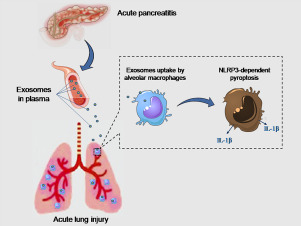当前位置:
X-MOL 学术
›
BBA Mol. Basis Dis.
›
论文详情
Our official English website, www.x-mol.net, welcomes your feedback! (Note: you will need to create a separate account there.)
Plasma-derived exosomes contribute to pancreatitis-associated lung injury by triggering NLRP3-dependent pyroptosis in alveolar macrophages.
Biochimica et Biophysica Acta (BBA) - Molecular Basis of Disease ( IF 6.2 ) Pub Date : 2020-01-15 , DOI: 10.1016/j.bbadis.2020.165685 Xiao-Bo Wu 1 , Hong-Yu Sun 2 , Zhu-Lin Luo 2 , Long Cheng 2 , Xing-Mei Duan 3 , Jian-Dong Ren 4
Biochimica et Biophysica Acta (BBA) - Molecular Basis of Disease ( IF 6.2 ) Pub Date : 2020-01-15 , DOI: 10.1016/j.bbadis.2020.165685 Xiao-Bo Wu 1 , Hong-Yu Sun 2 , Zhu-Lin Luo 2 , Long Cheng 2 , Xing-Mei Duan 3 , Jian-Dong Ren 4
Affiliation

|
Progression of acute pancreatitis (AP) into a severe form usually results in a life-threatening condition with multiple organ dysfunction, and in particular acute lung injury (ALI), often contributes to the majority of AP-associated deaths. Increasing evidence has shown that uncontrolled activation of the immune system with rapid production of inflammatory cytokines play a dominant role in this process. As an intracellular inflammatory signaling platform, the NOD-like receptor protein 3 (NLRP3) inflammasome, is recently reported to be involved in the pathogenesis of AP progression, however, the relationship between NLRP3 inflammasome activation and AP-associated lung injury remains unclear yet. Here, we show that NLRP3 inflammasome activation and subsequent pyroptosis in alveolar macrophages (AMs) is responsible for the lung injury secondary to AP. In addition, plasma-derived exosomes from AP mice is capable of triggering NLRP3-dependent pyroptosis in AMs. Inhibition of exosome release or uptake in vivo by inhibitors substantially suppresses AMs pyroptosis and thereby alleviates AP-induced pulmonary lesion. Collectively, the current work reveals for the first time the involvement of NLRP3-dependent pyroptosis induced by plasma exosomes in the pathogenesis of AP-induced ALI, suggesting that the exosome-mediated NLRP3 inflammatory pathway is a potential therapeutic target for the treatment of lung injury during AP.
中文翻译:

血浆来源的外来体通过触发肺泡巨噬细胞中的NLRP3依赖性焦磷酸化而导致胰腺炎相关的肺损伤。
急性胰腺炎(AP)演变为严重形式通常会导致威胁生命的疾病,并伴有多器官功能障碍,尤其是急性肺损伤(ALI),通常会导致大多数与AP相关的死亡。越来越多的证据表明,随着炎症细胞因子的快速产生,免疫系统的失控激活在这一过程中起着主导作用。作为一种细胞内炎症信号传递平台,最近报道了NOD样受体蛋白3(NLRP3)炎性小体参与AP进展的发病机理,但是,NLRP3炎性体活化与AP相关性肺损伤之间的关系尚不清楚。在这里,我们表明NLRP3炎性体激活和随后的肺泡巨噬细胞(AMs)的热凋亡是继发于AP的肺损伤的原因。此外,来自AP小鼠的血浆来源的外泌体能够触发AMs中的NLRP3依赖性焦磷酸化。抑制剂在体内抑制外泌体的释放或摄取,基本上抑制了AMs的热解,从而减轻了AP引起的肺部病变。总的来说,当前的工作首次揭示了血浆外泌体诱导的NLRP3依赖性焦磷酸化参与AP诱导的ALI的发病机制,这表明外泌体介导的NLRP3炎症途径是治疗肺损伤的潜在治疗靶点在AP期间。
更新日期:2020-01-15
中文翻译:

血浆来源的外来体通过触发肺泡巨噬细胞中的NLRP3依赖性焦磷酸化而导致胰腺炎相关的肺损伤。
急性胰腺炎(AP)演变为严重形式通常会导致威胁生命的疾病,并伴有多器官功能障碍,尤其是急性肺损伤(ALI),通常会导致大多数与AP相关的死亡。越来越多的证据表明,随着炎症细胞因子的快速产生,免疫系统的失控激活在这一过程中起着主导作用。作为一种细胞内炎症信号传递平台,最近报道了NOD样受体蛋白3(NLRP3)炎性小体参与AP进展的发病机理,但是,NLRP3炎性体活化与AP相关性肺损伤之间的关系尚不清楚。在这里,我们表明NLRP3炎性体激活和随后的肺泡巨噬细胞(AMs)的热凋亡是继发于AP的肺损伤的原因。此外,来自AP小鼠的血浆来源的外泌体能够触发AMs中的NLRP3依赖性焦磷酸化。抑制剂在体内抑制外泌体的释放或摄取,基本上抑制了AMs的热解,从而减轻了AP引起的肺部病变。总的来说,当前的工作首次揭示了血浆外泌体诱导的NLRP3依赖性焦磷酸化参与AP诱导的ALI的发病机制,这表明外泌体介导的NLRP3炎症途径是治疗肺损伤的潜在治疗靶点在AP期间。



























 京公网安备 11010802027423号
京公网安备 11010802027423号